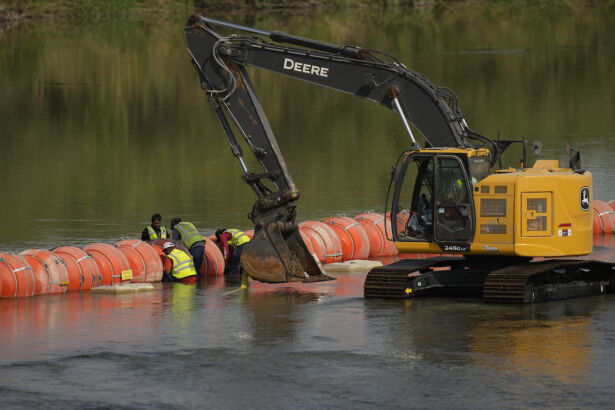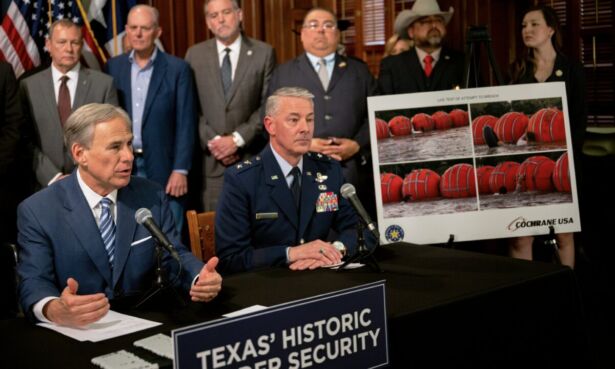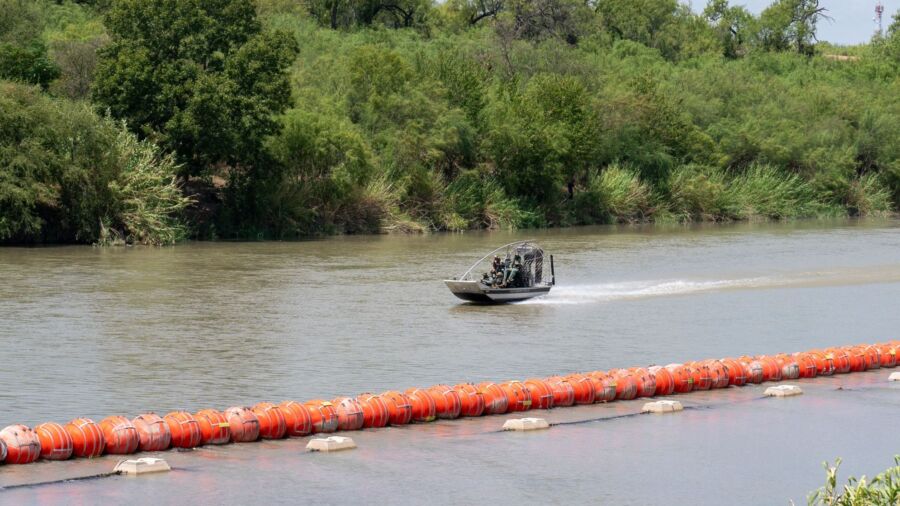A U.S. appeals court has temporarily put on hold an earlier order issued this week requiring Texas Gov. Greg Abbott to remove a 1,000-foot barrier of floating buoys deployed in the Rio Grande as part of efforts to deter illegal immigrants from crossing the U.S.–Mexico border.
The Sept. 7 decision was made by the New Orleans-based Fifth Circuit Court of Appeals—made up of a three-judge panel of two Democratic appointees and a Republican appointee—court documents (pdf) show.
Thursday’s ruling means the state will be allowed to leave the barrier in place for now while the case plays out in court.
The barrier of floating and rotating buoys, which are between four to six feet each, has been in place near the city of Eagle Pass since July as part of Mr. Abbott’s Operation Lone Star, a multi-agency effort to deter illegal crossings and prevent human smuggling across the border.
However, the Biden administration’s Department of Justice promptly sued Texas over the water barriers in July, citing humanitarian and environmental concerns and arguing that it disrupts navigation and was installed without permission from the U.S. Army Corps of Engineers.
Biden administration officials further contended the floating buoys may damage relations with Mexico and violate federal law and treaties with Mexico.
Thursday’s order came just one day after U.S. District Court Judge David Ezra, a President Ronald Reagan appointee, issued a preliminary injunction requiring Texas to relocate the buoys to an embankment on the Texas side of the river—and to cover the cost of moving them—by Sept 15.

Barrier a ‘Threat to Human Life’
In his order (pdf) the judge wrote that there is “little doubt that Texas’s 1,000-foot long, four-foot-wide floating barrier, anchored with metal wiring to heavy concrete blocks on the bed of the river, constitutes an obstruction to the navigation of the Rio Grande.”
“The Court finds that the barrier’s threat to human life, its impairment to free and safe navigation, and its contraindication to the balance of priorities Congress struck in the RHA outweigh Texas’s interest in implementing its buoy barrier in the Rio Grande River,” the judge wrote. “The harm to navigation is clearly evident from the evidence presented, while the State of Texas did not present any credible evidence that the buoy barrier as installed has significantly curtailed illegal immigration across the Rio Grande River.”
Judge Ezra also raised concerns that Texas’s actions could further harm relations between the United States and Mexico, noting that the barrier “has already placed tremendous strain” on “one of the most important, dynamic, and economically impactful partnerships in the world.”
“Defendants and anyone working on their behalf are enjoined and hereby prohibited from building new or placing additional buoys, blockades, or structures of any kind in the Rio Grande River pending final judgment in this matter,” the order stated.
However, attorneys for Texas argued in a court filing (pdf) Thursday that the preliminary injunction should be dropped, citing the ongoing immigration crisis and Texas’s authority to defend itself from what it described as a “transnational-criminal-cartel invasion.”

Border Fending Off ‘Criminal-Cartel Invasion’
“The United States failed to defend Texas’s borders, leading to millions of individuals and hundreds of millions of fatal doses of fentanyl, often trafficked by transnational criminal cartels, illegally entering Texas and the US,” lawyers for the state wrote.
“Consequently, the State declared a border-security disaster and placed an approximately 1,000-foot-long buoy system in the Rio Grande to prevent people and drugs from being trafficked into the State, violating federal and Texas law. The buoys have nearly eliminated illegal crossings of people and drugs where they’ve been placed,” they added.
Lawyers for the state also argued that Texas has “clear constitutional authority to defend its territory.”
“The buoys were deployed under the Governor’s constitutional authority to defend Texas from transnational-criminal-cartel invasion,” lawyers for the state wrote. “Moving the buoys exacerbates dangers to migrants enticed to cross the border unlawfully, and to Texans harmed by human trafficking, drug smuggling, and unchecked cartel violence,” they concluded.
Mr. Abbott has not yet commented on the latest ruling but vowed Wednesday not to back down when it comes to securing the border.
“We will continue to utilize every strategy to secure the border, including deploying Texas National Guard soldiers and Department of Public Safety troopers and installing strategic barriers,” the governor said.
“Our battle to defend Texas’s sovereign authority to protect lives from the chaos caused by President [Joe] Biden’s open border policies has only begun. Texas is prepared to take this fight all the way to the U.S. Supreme Court,” Mr. Abbott added.
The Epoch Times has contacted the DOJ for comment.
Caden Pearson contributed to this report.
From The Epoch Times

